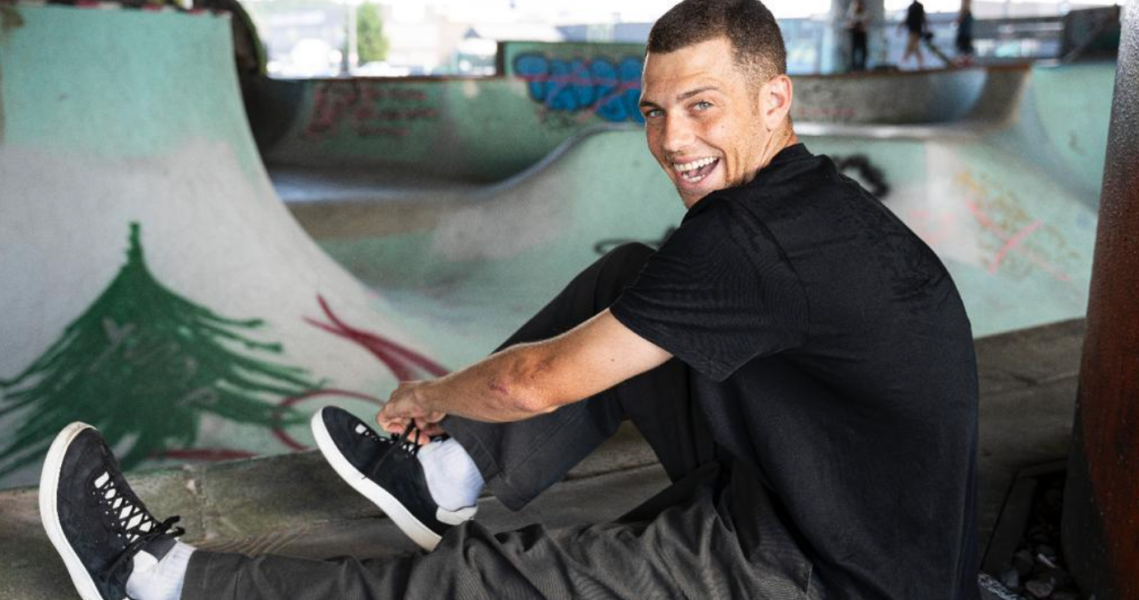Launched on Friday, the collaboration between sneaker brand P448 and Olympic hopeful skateboarder Yam Behar proves the power of an athlete-brand relationship that goes beyond a typical influencer deal. It’s also resulted in a better technical product.
Sneaker brand P448 has a long history of working with athletes and skaters. For example, female Olympic skateboarder Bombette Martin has been a global ambassador since last year, and has also helped the brand design a better product with her collection.
For his part, along with designing the P448 x YAM capsule collection, launched this week, Behar is being featured in brand campaigns. And, around the Olympics in the next year, he’ll be making appearances at brand events. The capsule collection features six skate sneakers for $305 each.
Yam Behar was heavily involved in the design, market research and material processes involved in creating a technical skate shoe that outperforms others on the market. The resulting shoe features a reinforced toe, more premium materials and more “board feel,” aka flexibility. It also doesn’t need to be “broken in” to wear for competitions, said Behar.
When the two collaborated, the brand prioritised the athlete’s involvement. “We work closely with the athlete and get their point of view of what they want to communicate, both from a stylistic standpoint and from a functionality standpoint, across in the product,” said Wayne Kulkin, founder and executive chairman of footwear brand portfolio StreetTrend, and P448’s creative director. “[We address,] ‘How does the product perform? Is it comfortable? Does it work? Is it cool?’”
P448 pays the athletes upfront and gives them a percentage of the sales.
The revenue of traditional skate-focused company Vans has lagged, seeing a 22% drop in the first quarter of this year. That’s as other skate-focused footwear brands have come to market. Sustainable sneaker brand Cariuma launched a skate collection in 2020, telling Glossy that, “Everyone complains that Vans and Converse aren’t comfortable, and more people are caring about sustainability.”
For Behar, the product launch is an opportunity to connect with his younger fans beyond his own Instagram and TikTok. “I use Instagram every day, all day — TikTok, as well. I post a lot and try to be connected with my followers, doing Q&As in my Stories and posting my locations when I’m going to skate parks,” he said. Yam has 12,600 followers on Instagram and a growing number of followers on TikTok, with some videos racking up 50,000 views.
Compared to other demos, Gen-Z is more interested in purpose-driven partnerships — a fact that P448 has considered when securing its athlete partnerships.
“In five years, the buying power of this generation will be bigger than any other generation in modern consumption,” said Kulkin. “These partnerships are a good way to give back to Gen Z [athletes] and help them be entrepreneurs and understand how the business works. They’re not driven by just the name of the brand; they’re driven by purpose. They’re also driven by the way something looks or the way it makes them feel, which is great from a creative standpoint. We’re not just stamping their name on the product.”
Extreme sports categories are becoming more popular because of the Olympics. Skateboarding and rock climbing were first introduced at the Tokyo Olympics in 2020. Now, as they prepare for the Paris Olympics in 2024, brands have a new roster of potential ambassadors.
The Paris Olympics have the potential to be more fashion-charged than other iterations, considering the capital’s historic contributions to the industry. LVMH was announced as a sponsor in August, and brands including Lacoste have already hired Olympic athletes as ambassadors leading up to the event.
“Skateboarding and other categories like Formula One are relevant, from a lifestyle perspective,” Kulkin said. “But they’re almost in their infancy — they’re subculture industries. And a lot of these athletes are way more accessible than those from other professional sports, like soccer or tennis.”




